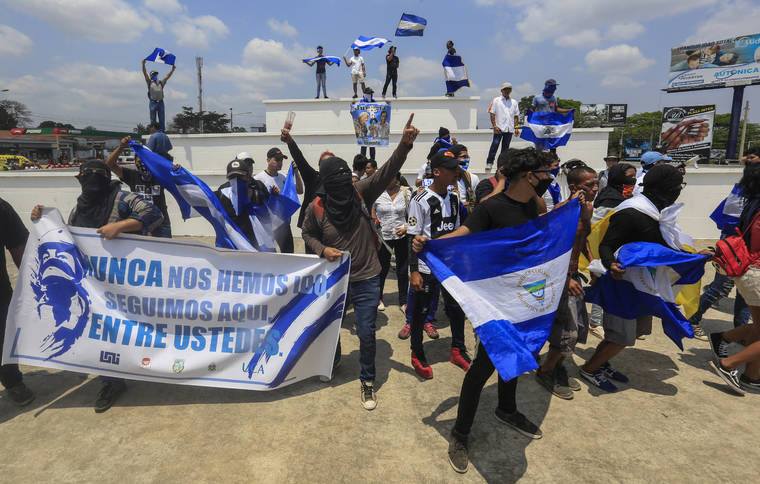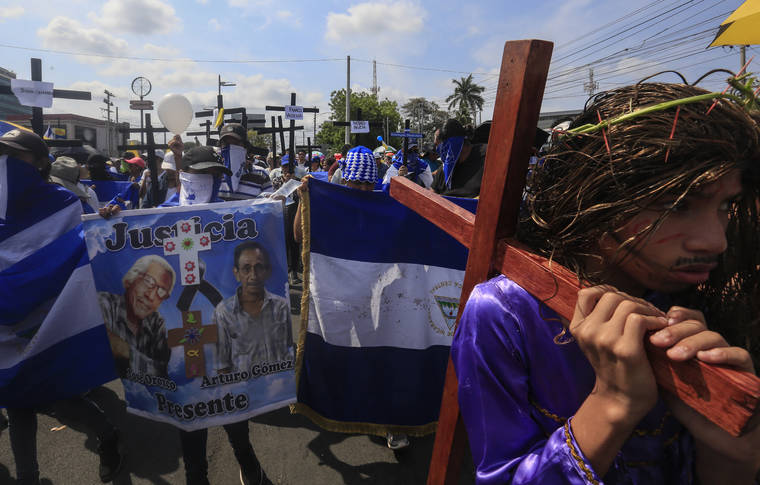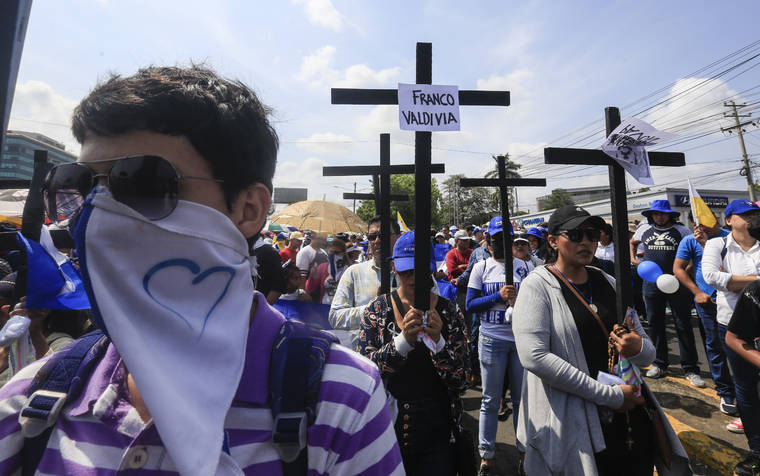MANAGUA, Nicaragua — Good Friday religious processions in Nicaragua’s capital took on a political tone as people seized a rare opportunity to renew protests against the government of President Daniel Ortega.
As hundreds of faithful walked in a traditional Stations of the Cross procession to the city’s cathedral, dozens of protesters shouted for “justice” and carried wooden crosses bearing the names of those who died during the past year of protests. They waved the blue-and-white Nicaraguan flag, which has become a symbol of the opposition.
When the protest continued outside the cathedral, riot police moved in to disperse them with deafening sound grenade-type devices and tear gas. Some young protesters threw rocks and sought shelter among the faithful inside the cathedral’s gates. Police surrounded the site.
José Pallais, a member of the opposition Civic Alliance who has participated in a dialogue with the government, said the Vatican’s ambassador Waldemar Sommertag was mediating between authorities and the opposition to win the safe passage of the protesters out of the cathedral.
Some protesters later left the cathedral, but late in the afternoon police were still outside the site and about 100 protesters remained inside, afraid to come out, Pallais said.
Pallais said he had heard of two injuries, including a young woman injured by a tear gas canister.
The National Police said in a statement they knew of no injuries and had arrested no one. They said masked protesters armed with rocks, homemade mortars and some with guns infiltrated the procession and then hid on the grounds of the cathedral.
On Wednesday, an overwhelming police presence scuttled a scheduled opposition march to mark the anniversary of the protests. Public demonstrations have been effectively banned in Nicaragua since last year.
Friday was the anniversary of the first three deaths after the government and armed supporters moved to quash the protests last year.
The Inter-American Commission on Human Rights says at least 325 people have died in the protests and government crackdown. Protests began in response to social security cuts and expanded to calls for Ortega’s ouster.
Ortega has maintained that last year’s protests were an attempted coup orchestrated by forces outside the country. International observers have found no evidence of a plot to overthrow of the one-time revolutionary who led the ouster of Anastasio Somoza in 1979.
This week U.S. National Security Adviser John Bolton announced additional sanctions against Nicaragua, European politicians called on the European Union to impose its own and Canada confirmed that it had cut nearly $20 million in direct aid to Ortega’s government.
James K. Hill, Canada’s ambassador to Nicaragua, Costa Rica and Honduras told the AP this week that repression by Nicaraguan authorities had led to the suspension of the financial support.
“Canada is concerned by the human rights situation and considers the repressive actions of the government unacceptable,” Hill said in a written response to the AP.
The government typically uses such direct foreign assistance to support its general budget. Canada suspended the assistance in August, but the government only confirmed it following a news report this week.
Hill said the aid carries conditions and wouldn’t be renewed until “there is satisfactory evidence of improvement with respect to the state of human rights in Nicaragua, which would be reported by independent sources.”
Canada continues to provide development assistance in Nicaragua – averaging about $15 million annually – through international and non-governmental organizations.




